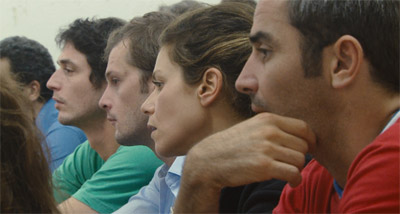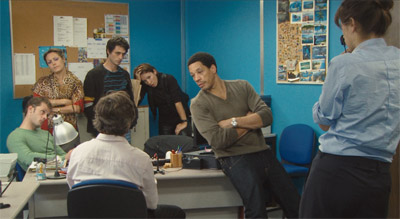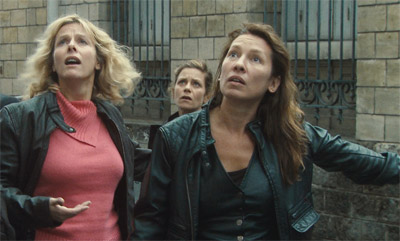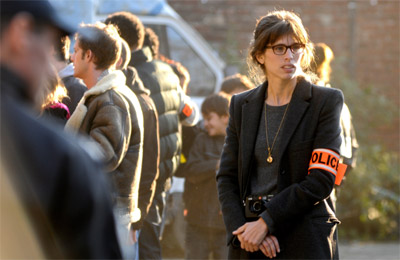Alain Attal Polisse Interview

Alain Attal Polisse Interview
Cast: Karin Viard, Joey Starr, Marina FoïsDirector: Maiweenn
Genre: Crime, Drama
Running Time: 127 minutes
Synopsis: The daily grind for the police officers of the Child Protection Unit - taking in child molesters, busting underage pickpockets and chewing over relationship issues at lunch; interrogating abusive parents, taking statements from children, confronting the excesses of teen sexuality, enjoying solidarity with colleagues and laughing uncontrollably at the most unthinkable moments.
Knowing the worst exists and living with it. How do these police officers balance their private lives and the reality they confront every working day?
Fred, the group's hypersensitive wild card, is going to have a hard time facing the scrutiny of Melissa, a photographer on a Ministry of the Interior assignment to document the unit.
Release Date: June 28th, 2012
Interview with Alain Attal
Question: How did you land the project?Alain Attal: Philippe Lefebvre, my partner at Les Productions du Trésor, met Maïwenn at a screening two years ago and told her that we greatly appreciated her work. Some time later she contacted me about a project. When she came to see me, I remember that she had brought along a paper-board like in a boardroom. Every page was divided into two columns. On the left-hand column you could read the cops' private lives in red letters, and on the right-hand column the cops' professional lives and the cases they were in charge of were written in black letters. Maïwenn, who had spent several weeks at the Child Protection Unit, had the whole movie mapped out in her head and she recounted it from beginning to end. And when there were no more than a few script pages, I said OK! What she told me was so well structured in her mind and so exciting that she struck a chord with me. However I knew that the story had to be written more carefully than her previous movies even though she had told me that her scripts were mainly indicative and that the actual writing was essentially done during shooting and editing. She is a filmmaker driven by her instinct, always in quest of the truth.
 Question: What attracted you to the project?
Question: What attracted you to the project?Alain Attal: First of all, the subject matter was totally new and had never been approached in film. But most of all, I felt that she was quite possessed with the topic and therefore could make it into a film. When a talented filmmaker is eager to develop an idea I accept to help him or her out. That's what I find exciting about my job - helping a filmmaker develop subject matter that is close to his or her heart.
Question: Weren't you reluctant to produce yet another movie on police work?
Alain Attal: It did cross my mind but Maïwenn talked about her project in a way that was so different from all the classical thrillers that I decided pretty quickly. Child protection policemen rarely draw their guns and they are more involved in social issues than in law-and-order enforcement. This is something new in French thrillers.
Question: Was the film hard to put together?
Alain Attal: Very hard. From the beginning, I was pretty sure it was going to take Maïwenn a long time to shoot and edit because she pays great attention to texture, and shoots lots of dailies. Consequently at first the budget hovered around 6 million euros.
But I couldn't put up the money because the traditional networks wouldn't endorse the project even if they admitted that it was a powerful script. I was lucky to convince Mars, Canal + and Arte and they allowed me to put the film together. In the final reckoning it cost a little less than 5 million euros, and my company took a big risk. I must say I'm not very good at making money when I embark on a project!
Question: Did you get involved in the writing process?
Alain Attal: Although Maïwenn was reluctant at first, I asked her to write a more structured script than usual and to develop the arc of the characters and narrative, draft after draft, so that the storyline would be as close as possible to the story she wanted to tell. For example in the first draft Fred, played by Joeystarr, was so rebellious that he ended up being an outlaw. I thought it was a bit too conventional and suggested she re-write it. I must say she played ball and found these exchanges fruitful. And when she suggested hiring a co-writer I encouraged her to do so. My aim was to help her to become a more accomplished filmmaker without losing the modern aspect of her first two pieces but with a more structured and genre-related movie.
Question: How challenging was the production process?
Alain Attal: The most difficult thing was to get permission from the DDASS (the regional social services department) to film children in such an environment. Actually, this institution's duty - quite legitimately - is to protect children by helping them to distance themselves from the roles they play. And in POLISS children play molested and abused characters. The DDASS was worried that these underage kids might not be emotionally equipped to separate fact from fiction and thus risk being traumatised. Consequently we handed the script over to them for scrutiny and Maïwenn cooperated and changed details to comply with their demands. She never balked at changing things in the script and never seemed outraged.
 Question: The film makes a strong political statement.
Question: The film makes a strong political statement.Alain Attal: Yes, but probably more so from my point of view than from the point of view of Maïwenn, who is a spontaneous filmmaker in constant search of the truth. As a producer I assume full responsibility for producing a film about people whose mission it is to serve their fellow citizens: as cops they must make sure those children are not abused, even if they have to intrude into people's private lives and barge into their homes. They are quiet super heroes who work behind the scenes for all of us.
Question: Weren't you afraid to cast Joeystarr as a cop?
Alain Attal: We insisted on the entire cast looking credible, human and extremely sensitive. Who better than Joeystarr to play his part? In The Actress' Ball, Maïwenn had cast him as a hypersensitive deeply human character and had brought to light an unexpected aspect of his personality. In Poliss, Fred (Joeystarr's character) would like to solve every case of child abuse in France. He wants to bear the burden of all the pain by himself and finds it very hard to endure.
Question: What was your reaction when you found out there were over 150 hours of dailies?
Alain Attal: Maïwenn had warned me that the edit would take a long time. However I wasn't too worried because I am convinced that movies already "exist" amidst the dailies but that they must be "found". And while I was watching the dailies for hours every day, I felt that there was something there, some magic behind the scenes captured, and I felt confident.
Question: Stephen Warbeck, who wrote the score for Poliss, had already written the score for A View Of Love, which you produced.
Alain Attal: After Nicole Garcia, Maïwenn is the second woman whose films I have produced. And even if they make very different films they harbour similar doubts and their approach to directing actors has much in common. Therefore I proposed to Maïwenn to come to a screening of A View Of Love and when she discovered Stephen Warbeck's music she wanted to meet with him. At first she made it clear she wouldn't have any music, then she came round and realised that she would need at least some minimalist music, to illustrate the characters' feelings.
 Question: How important is the fact that film has been selected at the Cannes Film Festival?
Question: How important is the fact that film has been selected at the Cannes Film Festival? Alain Attal: First of all I am very happy to be entering the official competition. I think that the Cannes Film Festival will put our film in the spotlight, which will give it international exposure. And I haven't heard of any French or foreign films raising this issue from the viewpoint of a task force.
For some years now there has been an increasing public awareness and more people have been facing up to the issues of child abuse and paedophilia. I hope that POLISS will help continue raising people's awareness and help put child protection at the heart of our everyday concerns.
MORE
- Mission: Impossible Fallout
- Glenn Close The Wife
- Allison Chhorn Stanley's Mouth Interview
- Benicio Del Toro Sicario: Day of the Soldado
- Dame Judi Dench Tea With The Dames
- Sandra Bullock Ocean's 8
- Chris Pratt Jurassic World: Fallen Kingdom
- Claudia Sangiorgi Dalimore and Michelle Grace...
- Rachel McAdams Disobedience Interview
- Sebastián Lelio and Alessandro Nivola...
- Perri Cummings Trench Interview



